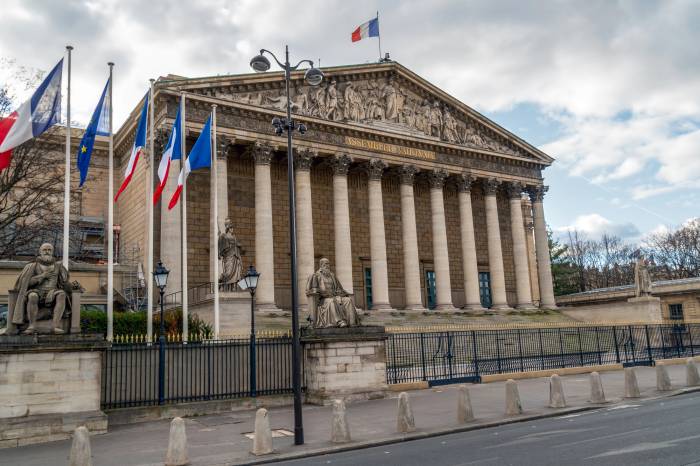L'Assemblée française envisage de mettre fin à la vente d'alcool dans son bar parlementaire emblématique
La proposition vise à mettre un terme aux ventes dans les bars et au remboursement des boissons alcoolisées des députés, ce qui suscite un débat sur la tradition et les dépenses publiques.
11-11-2025

L'Assemblée nationale française examine une proposition qui pourrait mettre fin à la vente d'alcool dans son bar parlementaire, connu sous le nom de "buvette". L'initiative a été présentée le 31 octobre par Emmanuel Duplessy, député du parti Génération. La proposition de M. Duplessy vise à interdire la vente de boissons alcoolisées au sein du Palais Bourbon, où se réunit l'Assemblée. Cette mesure s'inscrit dans une démarche plus large d'optimisation des dépenses publiques et de révision des pratiques internes à l'Assemblée.
Selon les données citées par Duplessy, les ventes de boissons alcoolisées au sein de la buvette ont généré moins de 100 000 euros l'année dernière. Le rapport note que ces ventes ne sont pas limitées aux seuls députés. La buvette est également ouverte aux ministres, aux membres du personnel, aux conseillers ministériels et aux anciens députés. Cet accès plus large rend difficile la détermination exacte de la quantité d'alcool consommée par les législateurs actuels.
La proposition de M. Duplessy va plus loin que l'interdiction de la vente d'alcool au bar. Il souhaite également mettre fin au remboursement des boissons alcoolisées achetées pendant les repas par les députés. Actuellement, les députés peuvent demander le remboursement de ces dépenses par le biais de leur avance mensuelle pour frais de mandat (AFM), un système introduit en 2018. L'AFM permet aux parlementaires d'être remboursés pour les frais liés à leurs fonctions officielles qui ne sont pas autrement couverts ou remboursés par l'Assemblée. Ces frais peuvent inclure les déplacements, l'hébergement et les repas, la plupart des députés recevant une indemnité mensuelle de 6 553 euros.
Dans son rapport, M. Duplessy s'inquiète à la fois de la santé publique et de la perception de l'opinion publique. Il s'interroge sur l'opportunité pour les députés d'utiliser des fonds publics pour payer du vin ou d'autres boissons alcoolisées consommées au travail entre les sessions. Il souligne également que de nombreux Français sont mal à l'aise à l'idée que de l'alcool soit vendu sur un lieu de travail tel que l'Assemblée nationale.
Toutefois, les changements proposés ne s'appliqueraient pas à toutes les situations impliquant de l'alcool. Le rapport précise que des exceptions subsisteraient pour les coûts liés à l'organisation de réceptions, de cérémonies ou de dîners de travail au cours desquels les invités pourraient consommer de l'alcool. Ces événements sont considérés comme faisant partie des fonctions parlementaires officielles et seraient toujours éligibles au remboursement selon les règles actuelles.
Le débat sur l'alcool à l'Assemblée nationale s'inscrit dans le cadre de discussions plus larges en France sur la transparence et l'utilisation responsable des fonds publics. Si certains considèrent que la tradition du vin et de la bière à la buvette fait partie de la culture politique française, d'autres estiment qu'il est temps de la modifier pour l'adapter aux normes modernes du monde du travail et aux attentes du public.
La proposition a suscité un débat parmi les députés et les observateurs sur la question de savoir si de telles mesures sont nécessaires ou symboliques. Certains législateurs ont exprimé leur soutien à des règles plus strictes en matière de consommation et de remboursement de l'alcool, tandis que d'autres défendent les pratiques existantes comme étant raisonnables et enracinées dans la tradition.
Aucune décision définitive n'a encore été prise sur la proposition de M. Duplessy. La question sera probablement débattue plus avant dans le cadre des révisions en cours des budgets parlementaires et des règlements internes. Pour l'instant, le vin et la bière restent disponibles à la buvette, mais leur avenir dans les couloirs du pouvoir français est incertain, car les législateurs mettent en balance la tradition et les appels à la réforme.
Fondée en 2007, Vinetur® est une marque déposée de VGSC S.L. qui a une longue histoire dans le secteur du vin.
VGSC, S.L., dont le numéro de TVA est ESB70255591, est une entité inscrite au registre du commerce de Saint-Jacques-de-Compostelle, Spagna.
Email: [email protected]
Sede e uffici a Vilagarcia de Arousa, Galice.